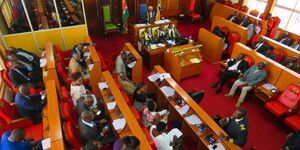The government has made provisions to protect employees from rogue bosses and co-workers.
In new guidelines published by Attorney General Kihara Kariuki, the government seeks to shield whistleblowers from being targeted by corrupt managers or co-workers in both public and private institutions.
He stated that the whistleblowers and witnesses must be protected from “intimidation or harassment for providing information on bribery or corruption or giving evidence in court”.
The AG noted that it is prudent for the country to protect its workforce from threats and intimidation when they provide information in suspected cases of corruption.
“Any person who demotes, admonishes, dismisses from employment, transfers to unfavourable working areas or otherwise harasses and intimidates a whistleblower, informant or witness will commit an offence and is liable, upon conviction, to a fine not exceeding Ksh1 million or to imprisonment for a term not exceeding one year, or to both,” AG Kariuki warned.
The AG stated that both private and public organisations will be mandated to publish anti-bribery and anti-corruption policies that will show how the company deals with presumed cases of graft.
Further, the AG indicated that the guidelines will help these institutions to come up with their own documents that summarise the procedures for the prevention of bribery and corruption.
“The bribery Act 2016 requires public and private entities to establish procedures for the prevention of bribery and corruption. An entity that fails to establish bribery and corruption prevention procedures commits an offence,” the AG stated.
AG Kariuki noted that the Ethics and Anti-Corruption Commission (EACC) will assist the private and public institutions to come up with anti-graft policies.
They will be published and deposited as binding documents that allow the companies to know what to systematically do should they have a corruption matter to report or investigate.
“The Cabinet Secretary, in consultation with the EACC, is required to publish guidelines to assist private and public entities in the preparation of procedures required under the Bribery Act,” the AG added.
“Each State officer, public officer or person holding a position of authority in a private entity shall report knowledge or suspicion of an act of bribery or corruption within twenty-four hours thereof.”












